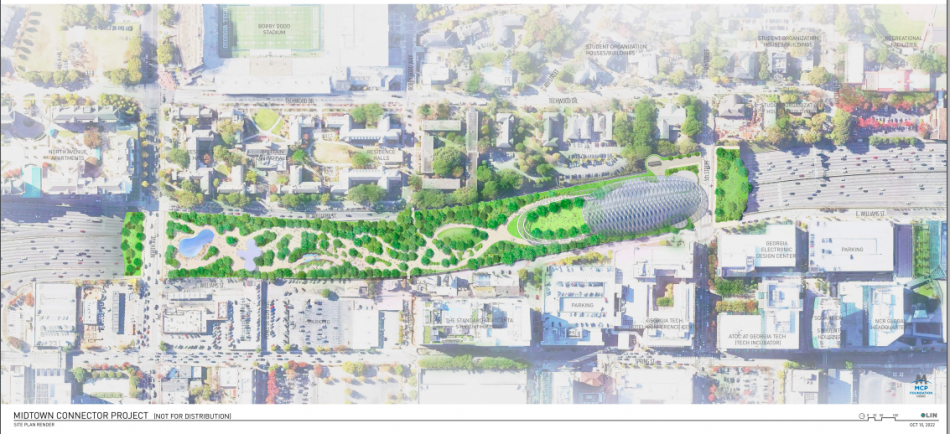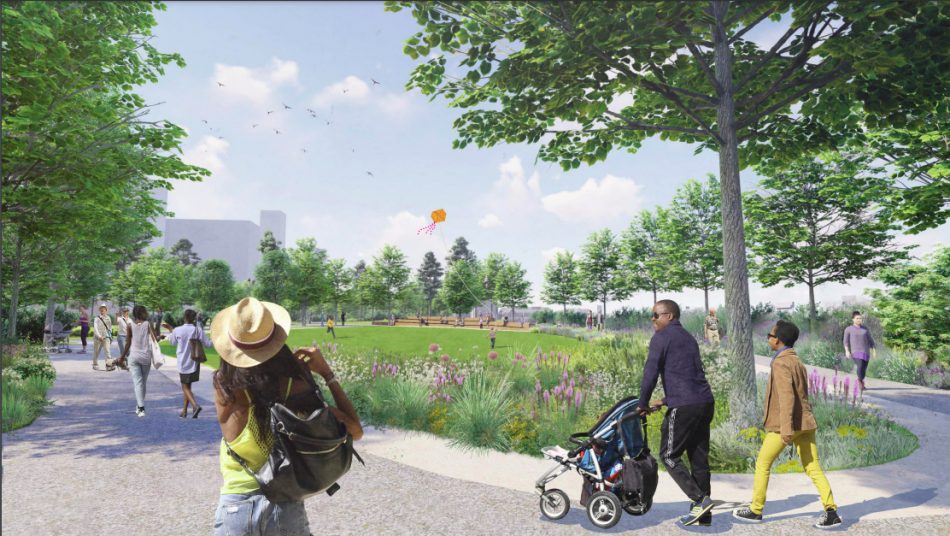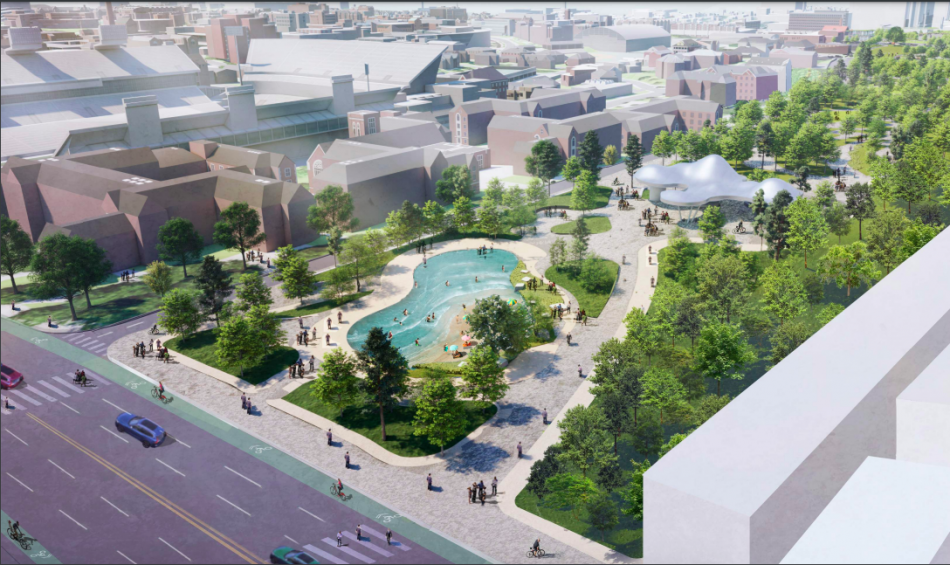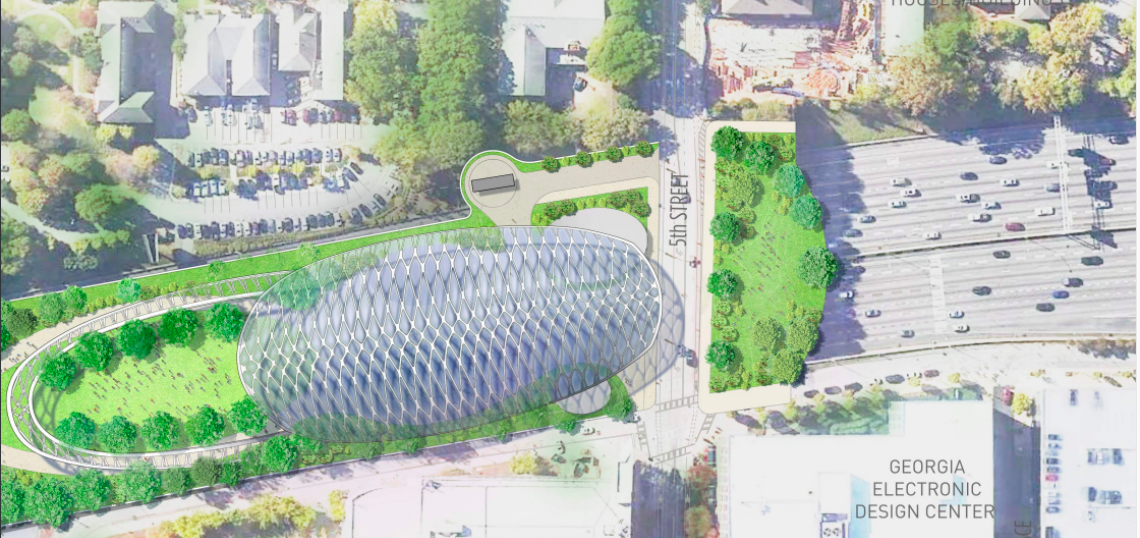Inquiries to the team behind Midtown’s vision for a highway-capping park have been met throughout this year with uncharacteristic silence. Now it’s apparent why.
Doug Hooker, CEO of the Connector Park Foundation and former head of the Atlanta Regional Commission, announced this week that plans for Atlanta’s Connector Park—formerly known as the Midtown Connector—are being shelved indefinitely, before a shovel met dirt. That whittles the dreams for three separate highway-capping parks over Atlanta freeways from three to two, at least for the foreseeable future.
But it wasn’t for lack of trying, according to Hooker.
In an op-ed titled “A Beautiful Vision, Atlanta's Connector Park” first published in the Atlanta Business Chronicle, Hooker chronicles how the idea for a downtown Connector-spanning greenspace was conceived more than 30 years ago, but that plan ultimately faltered when Hooker, then head of the city’s public works, determined it couldn’t be built before the 1996 Centennial Olympic Games.
 Overview of revised Connector Park plans, stretching from North Avenue to 5th Street instead of 10th Street. Courtesy of MCP Foundation
Overview of revised Connector Park plans, stretching from North Avenue to 5th Street instead of 10th Street. Courtesy of MCP Foundation
The Midtown vision was revived in 2017 by billionaire Chick-fil-A chairman Dan Cathy, who viewed the project as a bridge from Midtown’s bustling business district to Georgia Tech and residential neighborhoods on the west side of the freeway. A team, led by former BeltLine CEO Paul Morris, visited similar projects around the world but shelved their plans during the COVID-19 pandemic.
Once the concept was revived and community forums held for input, Hooker took the reins in 2022 after retiring from the ARC, lending the project what seemed its strongest momentum to date—at least publicly.
A team of “globally renowned park designers and architects,” in Hooker’s words, adjusted the original 25-acre concept to less than half of that: a more realistic, 12-plus acre deck that would have spanned the Connector between 5th Street and North Avenue. Features would have included a “stunning performance venue” near the north end of the park for a wide range of events, plus gardens, streams, reflecting pools, terraces, and more active uses such as recreational lawns, a dog park, and a nature play area, according to Hooker.
The Connector Park team, over the past year and 1/2 , completed park design, preliminary engineering, a financial modeling and funding analysis, and designs of the pavilion, plus studies concerning security, environmental, and economic impacts. According to Hooker, the team also hosted delegations from around the U.S. to share the vision and collect insight, and met with business and civic leaders around the Atlanta region.
“Today, we know with a high degree of certainty that this project can be built, how much it will cost, how to pay for it, and the long-term benefits it can bring to our community and environment,” Hooker wrote in the op-ed.
“Because Atlanta’s Connector Park would be built over a federal highway, it must be constructed and owned by a public entity, which is why we have worked closely with multiple agencies in search of a suitable public partner to help move this project forward,” Hooker continued. “With several exciting infrastructure projects happening in the region and across the state, there is currently no public partner with the capacity for this project, so we must bring this chapter of its planning to a close and suspend our work at this time.”
 Many early, peopled renderings for the Midtown Connector are obsolete, but this one remained accurate to the final days. Courtesy of MCP Foundation
Many early, peopled renderings for the Midtown Connector are obsolete, but this one remained accurate to the final days. Courtesy of MCP Foundation
 The North Avenue view, looking north, from near the original Varsity, where project leaders said construction should have started. The water feature would more likely have been a splash pad or wading fountain. Courtesy of MCP Foundation
The North Avenue view, looking north, from near the original Varsity, where project leaders said construction should have started. The water feature would more likely have been a splash pad or wading fountain. Courtesy of MCP Foundation
That’s a reference, in part, to downtown’s 14-acre Stitch project, which has succeeded in accumulating $158 million from the federal Reconnecting Communities and Neighborhoods program to fund a planning, design, and engineering phase that officially kicked off earlier this year.
Meanwhile, in Buckhead, the 9-acre, HUB404 highway-capping concept has also secured federal funding, as private fundraising efforts continue.
Hooker ends on an optimistic note in saying studies compiled by the Connector Park team will be preserved and made available for “future leaders” to bring the blueprint to life—whether that’s in three years or three decades.
“I believe today, as I did more than 30 years ago, that a project like this can transform our city and region,” wrote Hooker, adding: “Atlanta’s Connector Park is something Atlanta deserves and eventually will need.”
Until then, head to the gallery for a trip down Connector Park memory lane.
...
Follow us on social media:
Twitter / Facebook/and now: Instagram
• Midtown news, discussion (Urbanize Atlanta)






